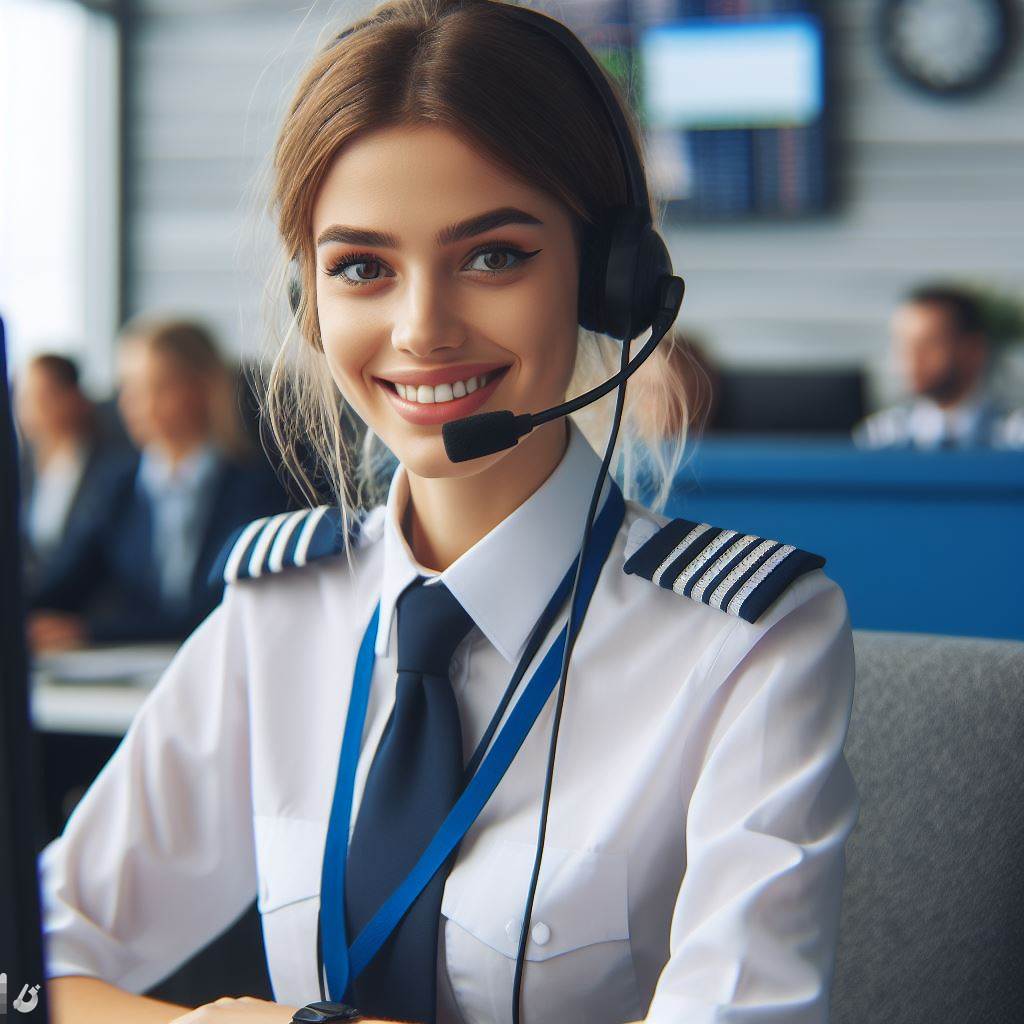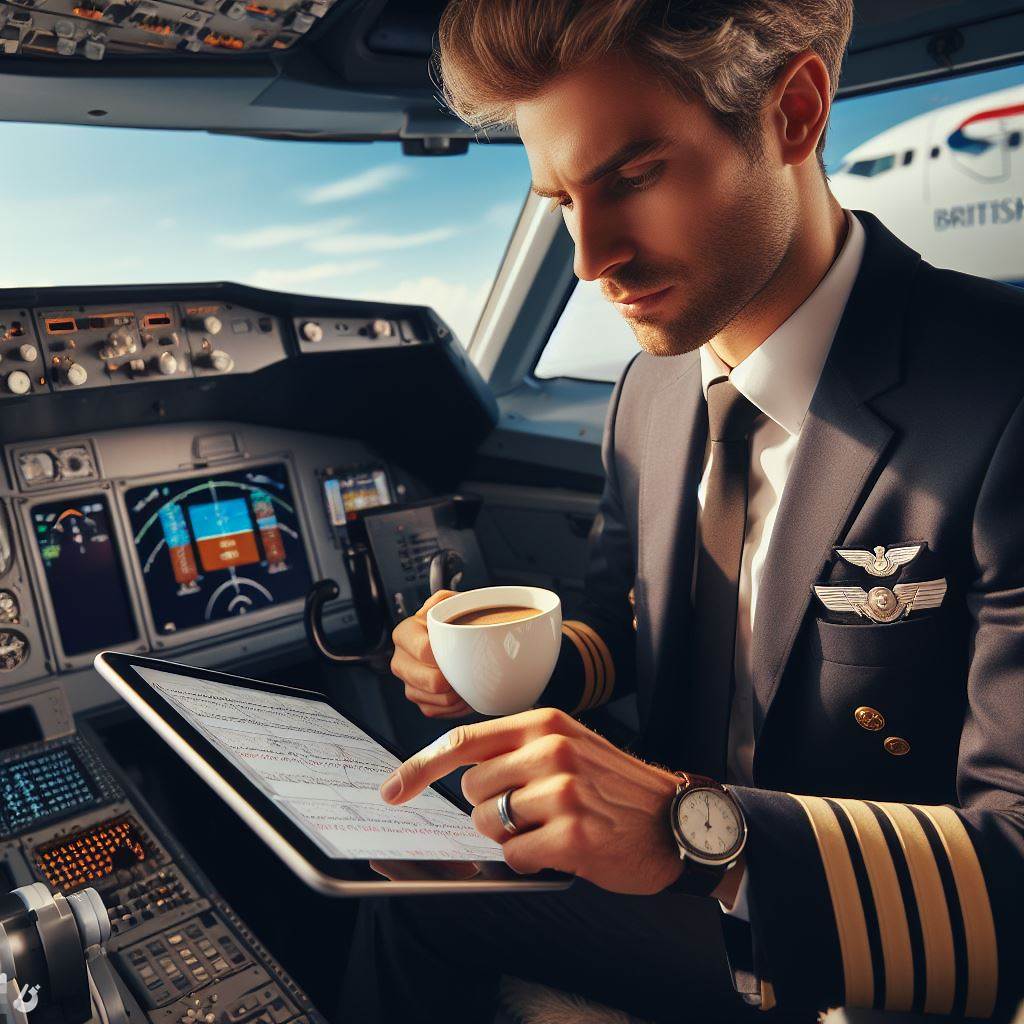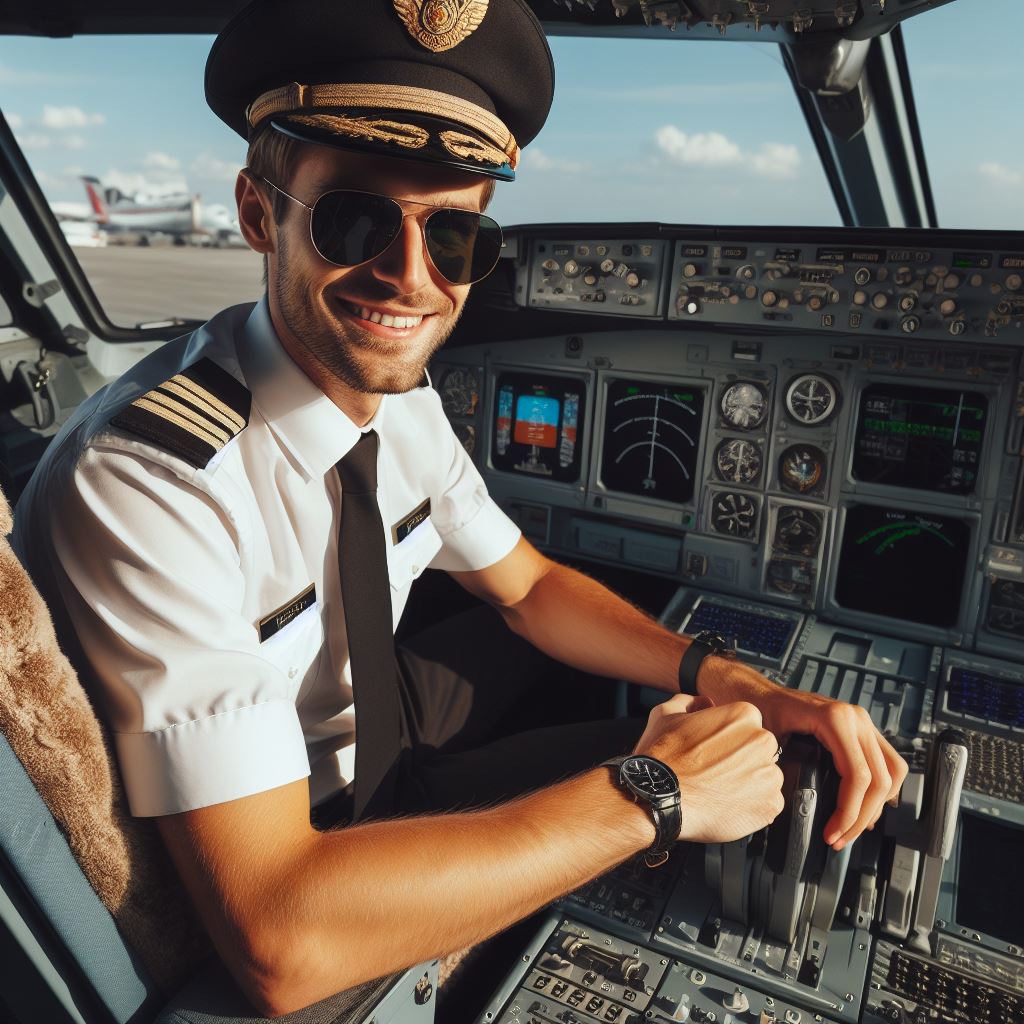Introduction
Becoming a pilot in the UK holds immense importance and appeal for many individuals.
The profession offers a unique blend of adventure, responsibility, and prestige.
With the high demand for pilots, there are abundant career opportunities in the aviation industry.
Being a pilot is a dream shared by countless individuals due to the thrill of flying and the sense of achievement it brings.
Pilots get to travel the world, experience different cultures, and witness breathtaking views from the cockpit.
In addition to the excitement, the role of a pilot carries significant responsibility. Pilots are responsible for the safety and well-being of the passengers and crew aboard the aircraft.
This level of trust and responsibility makes the profession appealing to those seeking a challenging and fulfilling career.
The aviation industry in the UK is experiencing unprecedented growth, leading to a high demand for qualified pilots.
Airlines are expanding their fleets, and new airlines are emerging, creating numerous job opportunities.
With this high demand, aspiring pilots can have a relatively smooth entry into the profession.
Furthermore, the potential career opportunities for pilots are vast.
Pilots can work for major airlines, private charter companies, or even start their own aviation businesses.
The diverse range of career paths allows pilots to specialize in various areas such as commercial aviation, cargo transportation, or flight instruction.
Overall, becoming a pilot in the UK offers immense importance, appeal, and numerous career opportunities.
The combination of adventure, responsibility, and the chance to travel the world make it an attractive choice for those with a passion for aviation.
Personalized UK Career Consulting
Receive tailored career guidance designed just for you. Get actionable steps and expert support to boost your career in 1-3 days. Take control of your career now.
Get StartedResearch and Education
A. The importance of conducting thorough research about the profession
Conducting thorough research about the profession is essential to becoming a pilot in the UK.
It allows aspiring pilots to gather information about the industry, understand the requirements, and make informed decisions.
B. The educational requirements for becoming a pilot in the UK
To become a pilot in the UK, there are specific educational requirements that must be met.
These requirements may vary depending on the type of pilot license one aims to obtain.
C. Information on different aviation training programs and schools in the country
Aviation training programs and schools play a crucial role in providing the necessary education and training to aspiring pilots.
These programs offer a range of courses designed to meet the requirements set by regulatory authorities.
There are different aviation training schools in the UK where individuals can pursue their pilot education.
These schools have qualified instructors and state-of-the-art facilities to ensure high-quality training.
D. The necessary certifications and licenses needed
Obtaining the necessary certifications and licenses is essential for aspiring pilots.
The Civil Aviation Authority (CAA) in the UK sets the standards and regulations for obtaining these certifications and licenses.
Pilots must obtain a Private Pilot License (PPL) as the first step towards a career in aviation. This license allows pilots to fly for leisure purposes.
However, for a career as a commercial pilot, additional certifications and licenses are needed.
To become a commercial pilot, individuals need to obtain a Commercial Pilot License (CPL) or an Airline Transport Pilot License (ATPL).
These licenses require further training, including instrument flight rating and multi-engine certification.
Your Dream Job Starts with a Perfect CV
Get a tailored CV and cover letter that captures your unique strengths and stands out in your industry. Let us help you make an unforgettable first impression.
Get StartedTheoretical knowledge is a significant part of becoming a pilot.
Aspiring pilots must complete theoretical exams covering subjects such as navigation, meteorology, principles of flight, and aviation law.
In addition to theoretical knowledge, practical flight training is essential.
Aspiring pilots need to accumulate a certain number of flight hours to meet the requirements for pilot licenses.
Aviation training programs provide a structured curriculum that includes both theoretical and practical training.
These programs ensure that students receive comprehensive training in all aspects of piloting.
After completing the necessary training and obtaining the required licenses, individuals can begin building their flying experience.
Flying as a co-pilot or flight instructor helps aspiring pilots gain the experience needed to progress in their career.
Continued education and training are essential for pilots to stay updated with the latest advancements in the industry.
The aviation field is continually evolving, and pilots need to stay current with regulations and advancements in technology.
In short, conducting thorough research and education is crucial for aspiring pilots in the UK.
It allows them to understand the requirements, choose the right training programs, and obtain the necessary certifications and licenses.
By investing in education and training, individuals can embark on a successful career as a pilot.
Read: A Day in the Life of a UK Airline Pilot
Optimize Your LinkedIn for Success
Boost your LinkedIn profile with a professional bio, keyword-rich headline, and strategic recommendations that attract recruiters. Stand out from the crowd and get noticed.
Optimize NowFinancial Considerations
The financial implications of becoming a pilot
In order to become a pilot, there are several financial implications that need to be considered.
A. The costs associated with training, licensing, and obtaining certifications
The costs associated with training, licensing, and obtaining certifications can be significant.
Firstly, the cost of flight training can vary depending on the type of pilot license you are pursuing.
For a private pilot license, the cost can range from £6,000 to £10,000.
However, for a commercial pilot license, the cost can be anywhere between £70,000 to £120,000.
Aside from the training costs, there are also additional expenses such as medical exams, flight simulator fees, aircraft rental, and exam fees.
These expenses can add up quickly and need to be factored into your budget.
B. Potential scholarship or funding options available
Fortunately, there are potential scholarship and funding options available for aspiring pilots.
Organizations like the Air League and the Honourable Company of Air Pilots offer scholarships and bursaries to help financially support individuals pursuing a career in aviation.
Additionally, some flight training schools offer financing options or payment plans to assist students in managing their tuition costs.
It is essential to research and inquire about these opportunities to determine if you qualify for any financial assistance.
C. The salary prospects of pilots in the UK
When it comes to the salary prospects of pilots in the UK, it can vary depending on the type of aircraft you fly and the level of experience you have.
On average, a newly qualified commercial pilot in the UK can expect to earn around £22,000 to £28,000 per year.
However, as you gain experience and move up the ranks, your salary can increase significantly.
Experienced pilots working for major airlines can earn between £50,000 to £100,000 per year, and airline captains can earn even more.
It is important to note that these salary figures are just estimates, and the exact amount can vary based on various factors such as the airline you work for, the number of hours you fly, and additional allowances.
Overall, pursuing a career as a pilot requires a significant financial investment.
The costs associated with training and licensing can be substantial, but there are potential scholarship and funding options available to assist aspiring pilots.
While the salary prospects in the UK can be lucrative, it is essential to consider all the financial implications before embarking on this career path.
Read: Interviews with Veteran UK Pilots
Preparing for Training
A. Physical and Medical Requirements for Becoming a Pilot
To become a pilot in the UK, there are certain physical and medical requirements that aspiring pilots must meet.
These requirements ensure that pilots are fit and healthy to fulfill the demanding responsibilities of the job.
B. Importance of Maintaining Good Physical Health and Eyesight
Maintaining good physical health is crucial for pilots as their job requires a high level of endurance and stamina.
Additionally, pilots must have excellent eyesight to effectively navigate through airspaces and read instruments.
C. Tips on Staying Fit and Healthy to Meet the Requirements
To meet the physical requirements, aspiring pilots should engage in regular exercise routines that focus on cardiovascular fitness and muscular strength.
Activities like running, swimming, and weightlifting can help improve overall fitness levels.
Proper nutrition is also essential to maintain good physical health.
Eating a balanced diet that includes fruits, vegetables, lean proteins, and whole grains can provide the necessary nutrients for optimal physical performance.
Getting enough rest and sleep is equally important for pilots.
Adequate rest allows the body to recover and recharge, ensuring that pilots are mentally alert and physically ready for any challenges they may encounter during flights.
- Engage in regular exercise routines that focus on cardiovascular fitness and muscular strength.
- Eat a balanced diet that includes fruits, vegetables, lean proteins, and whole grains.
- Ensure adequate rest and sleep to stay mentally alert and physically ready.
D. Preparation Needed for Pre-entry Exams
Before entering pilot training, aspiring pilots must pass pre-entry exams that assess their knowledge and aptitude for the role.
Proper preparation is essential to increase the chances of success in these exams.
E. Tips for Effective Exam Preparation
- Start studying early to allow ample time to cover all the necessary topics.
- Break down the material into manageable sections and create a study schedule.
- Utilize study resources such as textbooks, online courses, and practice exams.
- Review and revise regularly to reinforce understanding and retention of information.
- Seek guidance from experienced pilots or instructors if needed.
Stay focused and maintain a positive mindset during the exam preparation process.
Managing stress and staying motivated are crucial for effective studying and performing well in the exams.
Practice time management skills to ensure adequate time for study and revision.
Creating a study timetable and allocating specific time slots for different topics can help maximize productivity.
By understanding the physical and medical requirements, aspiring pilots can take the necessary steps to maintain good health and prepare effectively for pre-entry exams.
With thorough preparation and dedication, they can embark on their journey towards becoming a pilot in the UK.
Read: UK Pilot Gear and Equipment Essentials
Training Process
A. Stages of Pilot Training in the UK
- Private Pilot License (PPL): Start your training by obtaining a PPL, which allows you to fly for leisure or personal purposes.
- Instrument Rating (IR): Once you have your PPL, you can continue with an IR to be able to fly in various weather conditions.
- Commercial Pilot License (CPL): To fly for hire or reward, you need to obtain a CPL, which involves advanced flight training.
- Airline Transport Pilot License (ATPL): The highest level of professional pilot training that allows you to become a Captain.
B. Theoretical and Practical Components of the Training
The training process includes both theoretical knowledge and practical flight training.
- Theoretical Component: You will learn subjects such as aerodynamics, meteorology, navigation, and aviation regulations through ground school classes.
- Practical Component: Hands-on flying experience is crucial, starting with basic flight maneuvers and progressing to more complex procedures.
C. Duration of Training and Additional Requirements
The duration of pilot training can vary depending on individual circumstances and the type of license you aim to achieve.
- PPL: It typically takes around 6-12 months of part-time training to obtain a Private Pilot License.
- CPL: Commercial Pilot License training can take around 18-24 months, including flight hours and theory exams.
- ATPL: To become an airline pilot, the training duration can range from 1 to 3 years, depending on the training program.
Additionally, there are certain requirements you must meet, such as:
- Being at least 17 years old to obtain a PPL and 18 years old for a CPL or ATPL.
- Possessing a Class 1 Medical Certificate issued by an authorized Aviation Medical Examiner.
- Holding a valid English language proficiency certificate.
D. Insights into Simulator Training and Flight Hours
Simulator training plays a crucial role in a pilot’s training journey, allowing them to practice various scenarios in a controlled environment.
- You will undergo simulator training to practice emergency procedures, instrument approaches, and other critical flight scenarios.
- The number of flight hours required for each license varies. PPL requires a minimum of 45 hours, CPL requires 150 hours, and ATPL requires 1,500 hours.
- You will accumulate flight hours through both solo flights and flight training with qualified instructors.
Simulator training and flight hours are essential for developing the necessary skills and experience to become a competent and safe pilot.
Remember, becoming a pilot in the UK requires dedication, discipline, and a passion for aviation.
The training process may be challenging, but the rewards of flying make it all worthwhile.
Read: Famous British Pilots in History

Licensing and Certification
In order to become a pilot in the UK, it is crucial to obtain the necessary licenses and certifications.
This section will provide an overview of the process and requirements for obtaining a private pilot license (PPL), commercial pilot license (CPL), and airline transport pilot license (ATPL).
A. Obtaining a Private Pilot License (PPL) and Commercial Pilot License (CPL)
- The first step towards becoming a pilot is obtaining a private pilot license (PPL).
- To obtain a PPL, aspiring pilots must be at least 17 years old and hold a Class 2 medical certificate.
- Applicants must undergo ground training, which includes subjects such as air law, meteorology, and navigation.
- After completing the necessary ground training, candidates must pass a theory exam.
- Once the theory exam is passed, flight training is required, which consists of a minimum of 45 hours of flying.
- During flight training, candidates must acquire skills in various areas, including takeoffs, landings, navigation, and emergency procedures.
- Upon completion of flight training, pilots must pass a flight skills test conducted by a certified flight examiner.
- With a PPL, pilots can fly for recreational purposes or pursue further training for a commercial pilot license (CPL).
- To obtain a CPL, pilots must be at least 18 years old and hold a Class 1 medical certificate.
- Candidates must accumulate a minimum of 150 hours of flight time, including 100 hours as pilot-in-command.
- In addition to flight hours, CPL applicants must undergo further theoretical training and pass additional exams.
- CPL holders can work as professional pilots, providing services such as aerial photography, charter flights, or flight instruction.
B. Requirements for Obtaining an Airline Transport Pilot License (ATPL)
- The highest level of pilot certification in the UK is the airline transport pilot license (ATPL).
- To obtain an ATPL, pilots must be at least 21 years old and hold a Class 1 medical certificate.|
- Candidates must have a minimum of 1,500 hours of flight time, including 500 hours as pilot-in-command.
- Pilots aspiring for an ATPL must undergo approved training at an authorized training organization (ATO).
- Training for the ATPL includes ground school, simulator sessions, and flight training in multi-engine aircraft.
- Upon completion of training, candidates must pass the ATPL theoretical knowledge exams.
- After passing the theoretical exams, pilots must undertake a multi-crew cooperation course and a jet orientation course.
- Finally, candidates must pass a skill test conducted by an approved flight examiner to obtain an ATPL.
- With an ATPL, pilots are eligible to fly as commercial airline pilots, operating large passenger aircraft.
C. Necessary Exams and Assessments
Throughout the licensing process, aspiring pilots are required to pass various exams and assessments.
- The theory exams for PPL, CPL, and ATPL cover subjects such as meteorology, navigation, and aircraft systems.
- Exams are conducted by the Civil Aviation Authority (CAA) and consist of multiple-choice questions.
- Practical assessments include flight skills tests, which evaluate a pilot’s flying abilities.
- Flight skills tests are conducted by certified flight examiners approved by the CAA.
D. Ongoing Requirements and Renewals
Once pilots obtain their licenses, there are ongoing requirements and renewals to ensure their skills and knowledge remain up to date.
- To maintain a PPL, pilots must undertake a minimum of 12 hours of flight time and complete a medical examination every two years.
- CPL and ATPL holders must meet requirements such as completing regular simulator training and undergoing medical examinations.
- Additionally, pilots must adhere to the regulations set by the CAA and the specific requirements of their employers.
Obtaining a pilot license is a significant achievement that requires dedication, training, and ongoing commitment to safety and professionalism..
Building Flight Experience
In order to have better career opportunities in aviation, gaining flight experience is crucial.
Here are some key points to consider:
A. Importance of Gaining Flight Experience
- Flight experience is essential to demonstrate proficiency and competency as a pilot.
- It helps build practical skills, confidence, and knowledge about different aircraft systems and operations.
- Having flight experience increases your chances of getting hired by reputable airlines and aviation companies.
- Flight hours are often a requirement for advanced pilot certifications and licenses.
- Having flight experience enhances your problem-solving, decision-making, and communication abilities.
B. Various Ways to Gain Flight Hours
There are several avenues through which aspiring pilots can accumulate flight hours:
- Flight Instruction: Enrolling in flight schools and receiving instruction from certified flight instructors.
- Charter Services: Working as a charter pilot, flying clients to their destinations.
- Volunteer Work: Joining aviation organizations or non-profit groups that offer flying opportunities for charitable purposes.
- Flying Clubs: Becoming a member of flying clubs where you can rent aircraft and gain flight hours.
- Aerial Survey: Working for companies that conduct aerial surveying or mapping projects.
- Aerial Photography: Taking up aerial photography assignments, providing an opportunity to fly and capture stunning images.
C. Benefits of Joining Professional Associations or Organizations
Joining professional associations or organizations in the aviation industry can offer numerous advantages:
- Networking: Connecting with experienced pilots, industry professionals, and potential employers.
- Access to Information: Being aware of the latest developments, trends, and opportunities in the field of aviation.
- Career Support: Availing mentoring programs, job placement assistance, and career development resources.
- Training and Workshops: Participating in workshops and seminars to enhance skills and knowledge.
- Advocacy: Supporting and promoting the interests of pilots and the aviation community.
- Recognition: Some associations provide awards and recognition for outstanding achievements in aviation.
Overall, gaining flight experience is vital for aspiring pilots to enhance their skills, competency, and career prospects.
Whether through flight instruction, charter services, volunteer work, or joining professional associations, every opportunity brings valuable learning experiences and networking possibilities.
By actively seeking flight hours and expanding their aviation network, aspiring pilots can position themselves for success in the dynamic and exciting world of aviation.
Job Opportunities
A. Employment prospects for pilots in the UK
Employment prospects for pilots in the UK are generally good, with a growing demand for qualified professionals in the aviation industry.
B. The different sectors where pilots can work
Pilots can choose to work in different sectors, including commercial airlines, cargo operations, or private jet companies.
Commercial airlines offer the most common career path for pilots, providing opportunities to fly both domestic and international routes.
Cargo operations are another sector where pilots can find employment. They are responsible for transporting goods and cargo across various destinations.
Private jet companies provide opportunities for pilots to fly exclusive clients, such as high-profile individuals, celebrities, and corporate executives.
C. Potential career paths, including becoming an airline captain or flying for international airlines
Becoming an airline captain is a coveted position among pilots. It requires experience, skills, and proficiency to command an aircraft as a captain.
For those seeking international exposure, flying for international airlines can be a rewarding career option, allowing pilots to explore different countries and cultures.
D. The expected growth in the aviation industry and the need for more pilots
The aviation industry is expected to experience substantial growth in the coming years, leading to an increased demand for pilots.
Factors contributing to the growth include expanding global travel and tourism, economic development, and emerging markets in the aviation sector.
As older pilots retire, there will be a need for new pilots to fill the vacant positions, creating numerous job opportunities in the industry.
The demand for pilots is not limited to passenger flights but also extends to cargo transportation and private aviation services.
Additionally, advancements in technology have led to the introduction of new aircraft models, requiring pilots with knowledge of modern systems and controls.
There is also a growing trend towards environmentally-friendly aviation, leading to the development of electric and hybrid aircraft, which may create new job prospects for pilots.
While job opportunities exist, becoming a pilot requires dedication, perseverance, and a significant investment of time and money.
Prospective pilots must undergo thorough training, obtain necessary licenses and ratings, and accumulate flight hours to enhance their employability.
It is important for aspiring pilots to stay updated with industry trends and technological advancements, as these may shape future job prospects.
Pilots who exhibit exceptional skills, professionalism, and a strong work ethic have higher chances of securing desirable job positions.
With the right qualifications and experience, pilots can progress in their careers and potentially become trainers, management personnel, or even start their own aviation businesses.
It is essential for pilots to maintain a good physical and mental health, as these factors play a vital role in career longevity and job performance.
In summary, the aviation industry in the UK offers promising job opportunities for aspiring pilots, with various sectors and career paths to choose from.
With the expected growth in the industry, the demand for pilots is set to rise, making it an exciting time to pursue a career in aviation.
Conclusion
Becoming a pilot in the UK requires dedication, commitment, and hard work.
Throughout this guide, we have discussed the necessary steps and qualifications to pursue this career.
It is essential to obtain a Private Pilot Licence (PPL), complete flight training, and obtain an Airline Transport Pilot Licence (ATPL).
We have also explored the importance of obtaining a Class 1 Medical Certificate and the required academic qualifications.
Additionally, we have discussed the significance of gaining experience through flight hours and the various paths available, such as joining the military or becoming a flight instructor.
Becoming a pilot demands unwavering determination and a passion for aviation.
It is not an easy journey, but with perseverance, it is an incredibly rewarding profession.
The skies are limitless, and the ability to travel the world while doing what you love is truly remarkable.
If you have a dream of becoming a pilot, do not hesitate to pursue it.
Take the necessary steps, do your research, and connect with individuals in the aviation industry.
Surround yourself with like-minded individuals who share your passion and can provide guidance along the way.
Remember that the journey to becoming a pilot requires continuous learning and personal growth.
Stay informed about the latest advancements in aviation and seek opportunities for further development.
Here are additional resources and references that can help you on your path to becoming a pilot in the UK:
- The Civil Aviation Authority (CAA) website: www.caa.co.uk provides detailed information on licensing and regulations.
- Join online forums and communities such as PPRuNe (Professional Pilots Rumour Network) to connect with experienced pilots and gain insights.
- Consider joining aviation organizations or associations such as the British Airline Pilots’ Association (BALPA) for resources and networking opportunities.
Do not let anything hold you back from pursuing your dream of becoming a pilot.
It may require sacrifice and hard work, but the rewards are immeasurable.
Fly high and reach for the sky!
[E-Book for Sale]
500 Cutting-Edge Tech Startup Ideas for 2024 & 2025: Innovate, Create, Dominate
$19.99 • 500 Tech Startup Ideas • 62 pages
You will get inspired with 500 innovative tech startup ideas for 2024 and 2025, complete with concise descriptions to help you kickstart your entrepreneurial journey in AI, Blockchain, IoT, Fintech, and AR/VR.




